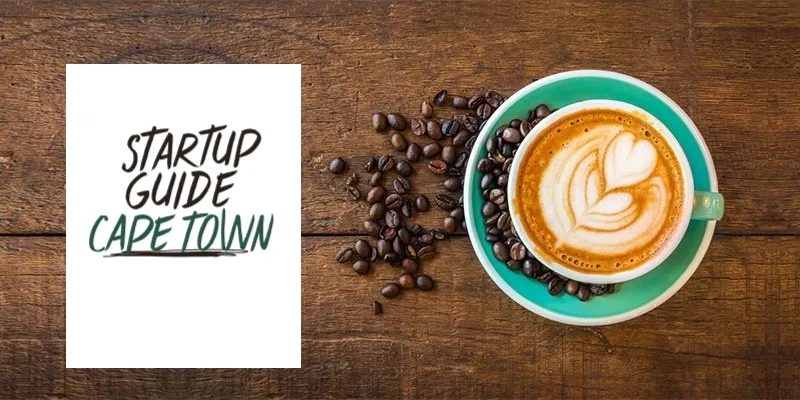Startup Guide Cape Town: how this African city has become a magnet for international entrepreneurial talent
'Startup Guide Cape Town' covers emerging startups, accelerators, co-working spaces, and support institutes in one of South Africa’s leading business and cultural hubs.
The Startup Guide series of books, launched in 2014 by Copenhagen-based publisher Sissel Hansen, covers over 20 cities such as London, Stockholm, Lisbon, Tokyo, Oslo and Miami. See our reviews of the guidebooks for New York, Berlin, Munich, Zurich, Paris, Johannesburg, Cairo, and Singapore.

Startup Guide Capetown is spread across 220 pages and makes for an informative and entertaining read, with profiles of founders, co-working spaces, accelerators, and other ecosystem players. Supported by Silicon Cape and Venture Burn as partners, the book also includes a three-page glossary of entrepreneurship terms.
Cape Town offers an international pool of talent, growing ecosystem of support, and relatively low cost of living, Sissel begins. Notable successes in recent years have been edtech platform Siyavula and healthtech startup LifeQ.
The Cape Innovation and Technology Initiative (CiTi) runs a number of incubator and accelerator programmes. Silicon Cape was founded in 2009 by entrepreneurs Vinny Lingham and Justin Stanford to support local startups.
Cape Town is home to 60 percent of all South African startups, according to Sumarie Roodt, Chairperson, Silicon Cape. Coming out of the legacy of apartheid, Cape Town offers a “wonderful base for pan-African collaboration”, she adds.
Overview
The book begins with an overview of Cape Town facts such as culture (melting pot of local and international cultures), spoken languages (English, Afrikaans, Xhosa), travel destination (one of the top in the world), cuisine (exquisite), bars and cafes (excellent), customs (braai barbecue), nature and sports (fantastic), wildlife (diverse), locals (chatty, friendly), and transportation (great but fragmented),
Cape Town also stands out for internet penetration (63 percent), presence of accelerators and co-working spaces (highest number in Africa), educational institutes (four world-class universities, two globally recognised business schools), and ease of doing business.
Of the more than 500 entrepreneurial companies in the Cape’s tech sector, 20 percent are in ecommerce and SaaS, and 15 percent in fintech. Its creative culture led it to be crowned the World Capital of Design in 2014, and there are a wide range of music and culinary festivals.
Earlier high-profile startups from Cape Town include Thawte, founded in 1995 by Mark Shuttleworth and sold to internet-security firm Verisign in 1999. More recent acquisitions include GetSmarter (by US edtech company 2U), Fundamo (by Visa) and Nimbula (by Oracle).
I. Startup profiles
One section of the book profiles 12 startups based in Cape Town. They include edtech platform Siyavula, which helps learners practice problems in math and science.
Aerobotics combines satellites and drone imagery with artificial intelligence to help farmers monitor their crops. DataProphet has developed AI solutions for the manufacturing sector and Industry 4.0, to detect defects and reduce scrap.
Custos Media Technologies uses watermarking technology and blockchain to protect digital media files from online piracy. Guardian Gabriel has wearable solutions for safety to thwart kidnapping incidents.
The Discoverikasi platform showcases cultural attractions in South Africa’s townships. Domestly is a scheduling app for booking trained and vetted domestic workers.
JUMO advances financial inclusion solutions in seven countries. Karri Payments offers mobile payment collection for schools and community organisations.
SnapScan offers QR code-based payment solutions for merchants, and has a partnership with Standard Bank. ThisIsMe offers tools to verify the identity of customers in the finance sector.
Some of these startups have been funded by investors such as 4Di, Nedbank, AgFunder, Knife Capital, Goldman Sachs, Kenya’s Savannah Fund, IDC (South Africa’s national development finance institution), Proparco (private sector financing arm of the French Development Agency), Finnfund, Gemcorp Capital, Leapfrog Investments, Vostok Emerging Finance, and Omidyar Network.
Some startups also received corporate support from Google Developers Launchpad Africa, Mercedes-Benz Innovation Challenge, MTN App of the Year Awards, and FSAT Labs incubator. The University of Stellenbosch and University of Cape Town’s Bertha Centre for Social Innovation and Entrepreneurship provide support for entrepreneurs as well.
II. Startup ecosystem
Two sections of the book profile the support system for startups, ranging from co-working spaces to programmes at incubators and accelerators. For example, active co-working spaces include Cape Town Office, Inner City Ideas Cartel, MEST Incubator Cape Town (by Meltwater Entrepreneurial School of Technology), and SAP Next-Gen Lab. Work & Co also offers a mobile office pod called Nova.
WorkInProgress, Absa’s innovation hub in Cape Town, is located at the iconic Woodstock Exchange building, regarded as the spiritual home of Cape Town’s startup space. One of the bigger co-working spaces in the city is Workshop17, located in the Watershed, which doubles as an arts-and-crafts market.
The Cape Innovation and Technology Initiative (CiTi) is the city’s oldest tech incubator, with roots tracing back to 1998. It runs the Bandwidth Barn hubs in Woodstock and Khayelitsha. It offers a three-month programme for women entrepreneurs, the six-month FutureMarkers initiative for idea-stage businesses, and a range of two-day to three-year business development support programmes.
Grindstone Accelerator helps scale-ups became sustainable and investable. It was launched in 2013 by VC firm Knife Capital. Its portfolio includes radar systems developer iKubu (subsequently acquired by Garmin), ticketing platform Quicket, gaming company Sea Monster, and anti-piracy solutions provider Custos Media Technologies.
GSB Solution Space is an incubator for early-stage startups. It was founded in 2014 at the University of Cape Town. It has partnered with the MTN Group, and works with cohorts of 10-15 startups in two batches per year. The programme is equity-free, and offers proof-of-concept opportunities with MTN.
Injini is an incubator and accelerator dedicated to edtech. Each participant is given a grant of 100,000 ZAR ($7,000). Success stories include Mtabe and M-Shule. LaunchLab Lift-Off is run out of the Stellenbosch University-based incubator LaunchLab. Its four zero-equity programmes include the LaunchLab Fellowship, Ideas, Build, and Countdown.
RLabs is a social impact accelerator and incubator programme for reconstructing marginalised communities. Founded in 2008, it has worked with more than 2,000 SMEs, and co-founds up to five startups a year through its Venture Garage.
SAP Next-Gen works with 3,700 educational institutions in 116 countries, and is present in Cape Town as well. It works with startups that are aligned with SAP’s commitment to the UN Sustainable Development Goals.
StartupBootcamp, founded in 2010, came to Cape Town in 2017; it is present in San Francisco, Berlin, Dubai, London, Melbourne and Mumbai. It has partnered with local corporates such as Old Mutual, RCS, and Nedbank. Each startup is given $17,000 and also gets mentorship and corporate connects.
Leaders of these support institutions list a number of success factors for entrepreneurs: passion, commitment, hustle, innovative mindset, continuous learning, questioning of assumptions, traction, teamwork, collaboration, and ability to find a market and align with corporate partners.
III. Expert insights
One section of the book provides tips from experts representing accelerators and startup support initiatives in the city. The advice covers accounting, finance, legal issues, and overall mission.
Eitan Stern, Director and Attorney at Legalese, advises founders to have clarity on whether they want to be registered as a company, partnership, or sole proprietorship. Winning a fundraising round doesn’t necessarily equate to success, he cautions. Investors may force founders to have goals that they might not want to have.
To avoid legal dispute further down the line, founders should have clarity on shareholding patterns, arrangements with suppliers, and status of industry regulations such as GDPR.
Jonathan Smit, Managing Director and Founder of online payment service provider PayFast, advises founders to learn the basic ropes of accounting. This includes expenses, cost of sales, profit margins, and fundraising from grants and entrepreneur-development programmes.
“Accounting is the language of business,” he explains. This becomes even more important once a startup begins to scale and raises funds.
Ann Rosenberg, SVP and Global Head of SAP Next-Gen, urges social entrepreneurs to be committed to tackling issues linked to the UN Global Goals. “Share your startup story with the world. Talk about your journey so others can learn from your experience,” she emphasises.
She also advises founders to tap into “science-fiction thinking” and Innovation 4.0 models. SAP Next-Gen has initiatives for women entrepreneurs, and has joined partners for the Epic Groundwater Challenge to close the gap between demand and supply of freshwater resources by 2030.
“Cape Town is a truly international city, and that’s part of the reason why it has such a strong startup ecosystem,” Ann observes.
IV. Founder advice
The book also features interviews with founders of six startups, tracing their entrepreneurial journeys, advice received, lessons learnt, and tips for the next wave of aspiring entrepreneurs.
Aisha Pandor founded SweepSouth, an on-demand, home-cleaning services platform, in 2014. She and her husband got the idea for the startup when they themselves needed temporary help at home when their regular domestic worker went on holiday. It attracted support from angel investors who also assisted in the tech space.
The received advice and peer support from Seed Academy, and later from the 500 Startups programme based in Silicon Valley. “The best South African founders are no less capable, intelligent or hardworking than founders based in the Valley,” Aisha enthuses. She lists good intuition as one of her strengths, as well as a mix of fast and slow thinking.
Pioneering startups need to do both marketing and education of the market, she observes. “Moving slowly destroys momentum, and new competitors could emerge at any point,” she cautions.
“Don’t wait for the right moment, the right time or the right person to share it with, just execute as soon as possible,” she advises aspiring founders. It is important to have mentors to strengthen confidence.
Antoinette Prophy was with McKinsey and founded AfroFusion advertising, before moving on to launch the 88 Business Collective, an 18-month accelerator programme for female founders. In the course of her journey, she had to deal with challenges such as corruption and a stalled acquisition bid.
“Part of the journey will entail failure. How you deal with it is vital, because the journey will be riddled with mistakes,” she advises aspiring entrepreneurs. This will bring maturity and acceptance that not all things will work.
While there is more support for entrepreneurs these days, Antoinette advises founders to get over the mental block that they cannot do without funding. She also calls for more diversity in investment firms.
“Founders are made of a special fibre: they’re visionary, eternally optimistic and innate problem-solvers,” she observes. She advises founders to have an advisory board and business coaches, which can help in better decision-making and growth.
Daniel Guasco is CEO of Click2Sure, a full-stack digital insurance platform. He earlier founded deals website Twangoo (acquired by Groupon) and angel investment fund Team Africa Ventures (with startups HealthQ, LulaLend, WumDrop).
“Everything always takes longer and always costs more, and it’s always a bigger challenge than it appears up front,” Daniel cautions aspiring founders. There are many unpredictable external factors.
To succeed takes risk appetite, conviction, and capacity to execute. “Build locally, raise and scale globally,” he advises. He finds Cape Town to be an attractive location, thanks to top talent from all over the world.
Justin Drennan is CEO of ParcelNinja, a cloud-based warehousing and delivery solution for ecommerce stores in South Africa. His earlier venture was WantItAll, to procure items from overseas.
He admits that he made many mistakes in his journey. “That’s not what is important, though; it’s what you do with them,” he advises aspiring founders. For international expansion, he recommends having a strong partner on the ground who understands all the nuances.
Justin also advises founders to hold out on investments until more traction is gained. It is important to hire the right staff, even if it may need more money. He found the Entrepreneurs Organisation to be a good sounding board.
Katlego Maphai is the Co-founder and CEO of fintech startup Yoco. Its mobile point-of-sale solution helps small businesses accept card payments. He was earlier with Accenture and Rocket Internet. “I see entrepreneurship as a very practical form of creativity,” he says.
“Don’t take short cuts, and be willing to throw away what you’ve already built in pursuit of a better customer experience,” he advises aspiring entrepreneurs. “Funding does follow great teams and great ideas with strong opportunities,” he adds.
But he cautions that investors may want to control the company and even aim for an exit too early. “VC is not suited for the early stages when you’re still trying to figure your economics out,” Katlego cautions.
Growth brings along with it additional complexities that need to be tackled with formal structures. “You need to think outside of the room and the perceived constraints you may have,” he adds. Networks of peers and an advisory board of experts help a lot.
Software engineer Tyrone Adams worked in the corporate world for a mere six months before founding Skywalk Innovations. It helps companies with digital transformation for new business models.
Talent and experience are both needed in the entrepreneurial journey, as well as the willingness to be teachable. In the heat of the moment, people can mess up a lot, Tyrone cautions. “Hard work is important, but hard and smart work have to come together,” he adds.
Getting close to the customer is important as well. “You should get out of the office, go out to 100 customers and see what they say,” he urges. Establishing a strong company culture is also key. “If you make people excited about your business, they will treat your customers in the right way,” Tyrone sums up.
V. Schools
One section of the book outlines education support initiatives for startups in Cape Town. For example, the University of Cape Town has a cousin of similar initiatives at Stanford and Potsdam universities, the d-school for design thinking. It advises entrepreneurs to be prepared to work in a team. They need to embrace new ways of thinking, and be willing to adapt.
The Interactive Community Access Network (I-CAN) Centre is an initiative of the Western Cape Department of Economic Development and Tourism. It offers internet access as well as courses in computer literacy, app development, and 3D printing. It runs programmes for school students and professionals, and urges future-oriented thinking and appetite for learning new skills.
Stellenbosch University, the second-highest-ranked higher learning institution in Africa, also offers support services for startups. It looks for entrepreneurs who can demonstrate large potential, show social impact, and have PR potential through interesting and inspiring stories.
WeThinkCode, founded by Arlene Mulder and Camille Agon, is a coding school in Johannesburg and Cape Town. It has a partnership with the Paris based Ecole 42, and has tied up with more than 40 corporates for tuition support. It encourages peer-to-peer problem solving, and looks for those who can demonstrate that they are ambitious and are self-starters.
VI. Investors
The last section of the book offers insights from six investment firms. Venture Capital firm 4Di Capital was founded by five entrepreneurs in 2011. Its portfolio includes healthtech company LifeQ, software startup Snapt, agritech company Aerobotics, and fintech platform .
“We see two types of opportunity for South African startups: expanding into developing African markets and into more developed markets elsewhere,” explains Managing Partner Anton van Vlaanderen.
Goodwell Investments is a private-equity impact-investing firm which was originally launched in India in 2006. It has expanded into Africa, and has invested in Nigerian payments company , fintech companies MFS Africa and Nomanini, and mobility startup WhereIsMyTransport.
“We believe tech is a hugely important accelerator that allows businesses to reach mass populations fast and relatively cheaply,” explains Investment Associate Danai Musandu.
Hlayisani Capital is a black-owned growth-fund that invests in high-growth businesses in Southern and Eastern Africa. Its founder, Brett Commaille, was a former CEO at Invenfin Venture Capital. It has invested in edtech startup Snapplify and mobility platform GoMetro.
VC firm Knife Capital emerged from the Here Be Dragons fund launched by South African billionaire Mark Shuttleworth. “Funding is an accelerator,” explains Co-Managing Partner Andrea Böhmert.
Its successes include CSense (exited to General Electric), fintech company Fundamo (exited to Visa), and Ordertalk (exited to UberEats). Current startups are AI company DataProphet, edtech service SkillUp Tutors, and ticketing startup Quicket.
Silvertree Internet Holdings addresses the consumer-facing digital space and branded FMCG. It was launched in 2013 by Manuel Koser and Peter Allerstorfer, who earlier founded South African ecommerce platforms Zando and Jumia.
“We don’t pass startups on like hot potatoes,” Manual explains. “We fund them based on what makes sense long term,” he adds. Current startups include PetHeaven, CarZar, CyberCellar, and CompareGuru.
Founded in 2017, Uprise.Africa is into equity crowdfunding, and has helped companies like Drifter Brewing Company.
Leaders in these funds explain that they are on the lookout for startups with an innovative product, strong team, ability to execute, strong company culture, local understanding, customer focus, differentiation, and potential for international growth or high margins
The book ends with a directory of useful resources for startups, meetups groups and events. These include Startup Grind Cape Town, Cape Town Business Growth Meetup and Digital Design Meetup, Free Cape Small Business Support Network, AfricArena, Future Females, and Geek Girls Dinner.
In sum, the book provides informative and entertaining insights into Cape Town’s startup ecosystem, as well as a useful framework for other cities to reflect on and improve their own startup ecosystems.
(Edited by Teja Lele Desai)









